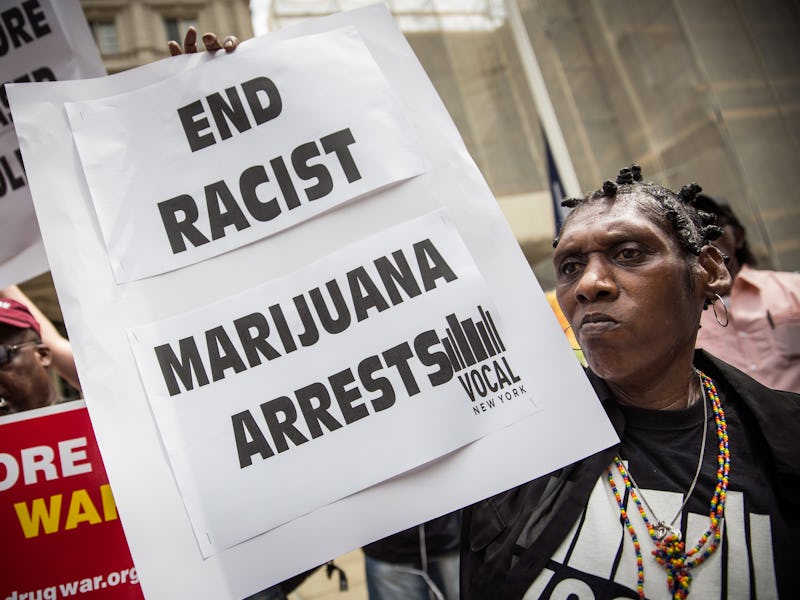New Bill Aims to Legalize Marijuana on a Federal Level
Senator Cory Booker introduced a legislation that will remove marijuana from the list of controlled substances.

A bill, introduced by New Jersey Senator Cory Booker on Tuesday, would declassify marijuana as a controlled substance, making it legal on a federal level, nationwide.
The bill, titled the Marijuana Justice Act, would remove marijuana from the list of Schedule I substances, where it currently resides, along with drugs like heroin and peyote. According to the Drug Enforcement Agency, Schedule I drugs have “no currently accepted medical use and a high potential for abuse.”
The bill would also provide groundwork for expunging and resentencing federal marijuana offenses, prevent deportations for marijuana charges, and cut federal funding towards law enforcement and prison infrastructure for states with disproportionate marijuana arrest and incarceration rates.
Signage outside of a medical marijuana evaluation clinic.
Twenty-nine states, as well as Washington, D.C., have already legalized medicinal marijuana. Recreational pot smoking is also legal in eight states and Washington, D.C.
Booker debuted the bill via a live stream on his official Facebook page, where he outlined its contents and fielded questions from commenters. Booker stressed the importance of the bill given the targeting of minorities, poor people, veterans, and the mentally ill in marijuana policing, and the “wildly disproportionate effect” that enforcement has on those vulnerable communities.
Booker has long been a vocal opponent of the War on Drugs and noted disparities in drug policing in his book, United, where he wrote that “the war on drugs has turned out to be a war on PEOPLE — and far too often a war on people of color and the poor.”
Numbers confirm that the current enforcement of marijuana policy is rife with racial bias. Black Americans are 3.7 times more likely to get arrested for marijuana possession than their white counterparts, according to analysis from the ACLU, and the imprisonment rate for black Americans for drug-related charges is almost six times that of white Americans.
Black Americans are imprisoned at five times the rate of white Americans.
Marijuana’s classification as a Schedule I drug has also been a strong prohibitive factor in studying its medicinal effects, despite evidence that it can be effective in the treatment of certain cancers, neurological ailments like Parkinson’s disease and Alzheimer’s, and pain management. Removing marijuana from the list of Schedule I drugs would open up more opportunities for scientists to find more medical uses for marijuana.
The federal legalization of medical marijuana could also prove critical in the American opioid epidemic. The Trump-formed Commission on Combating Drug Addiction and the Opioid Crisis issued a report on Monday that called for the president to “declare a state of emergency” based on the severity of opioid addiction nationwide. Multiple studies have demonstrated a correlation between marijuana legalization and a decrease in opioid abuse and overdose.
The Marijuana Justice Act’s path to legalization is not a direct one. Attorney General and Noted Racist Jeff Sessions has gone on record about his desire to crack down on marijuana and expand federal control over state marijuana laws. During the live stream, Booker called Sessions’s opposition to marijuana legalization “outrageous and unacceptable.”
Jeff, buddy, you look a little tense. I think I know something that could help you unwind...
Americans are keener on legal weed than ever before. According to a CBS News poll released in April, 61 percent of Americans favor legalizing marijuana.
Booker said that at the time of the live stream, the bill currently lacked other sponsors, and urged those watching to contact their representatives to ask them to support the bill.
“I don’t think folks understand that we are all implicated in this broken system,” Booker said. “Your tax dollars are being drained by this war on marijuana.”